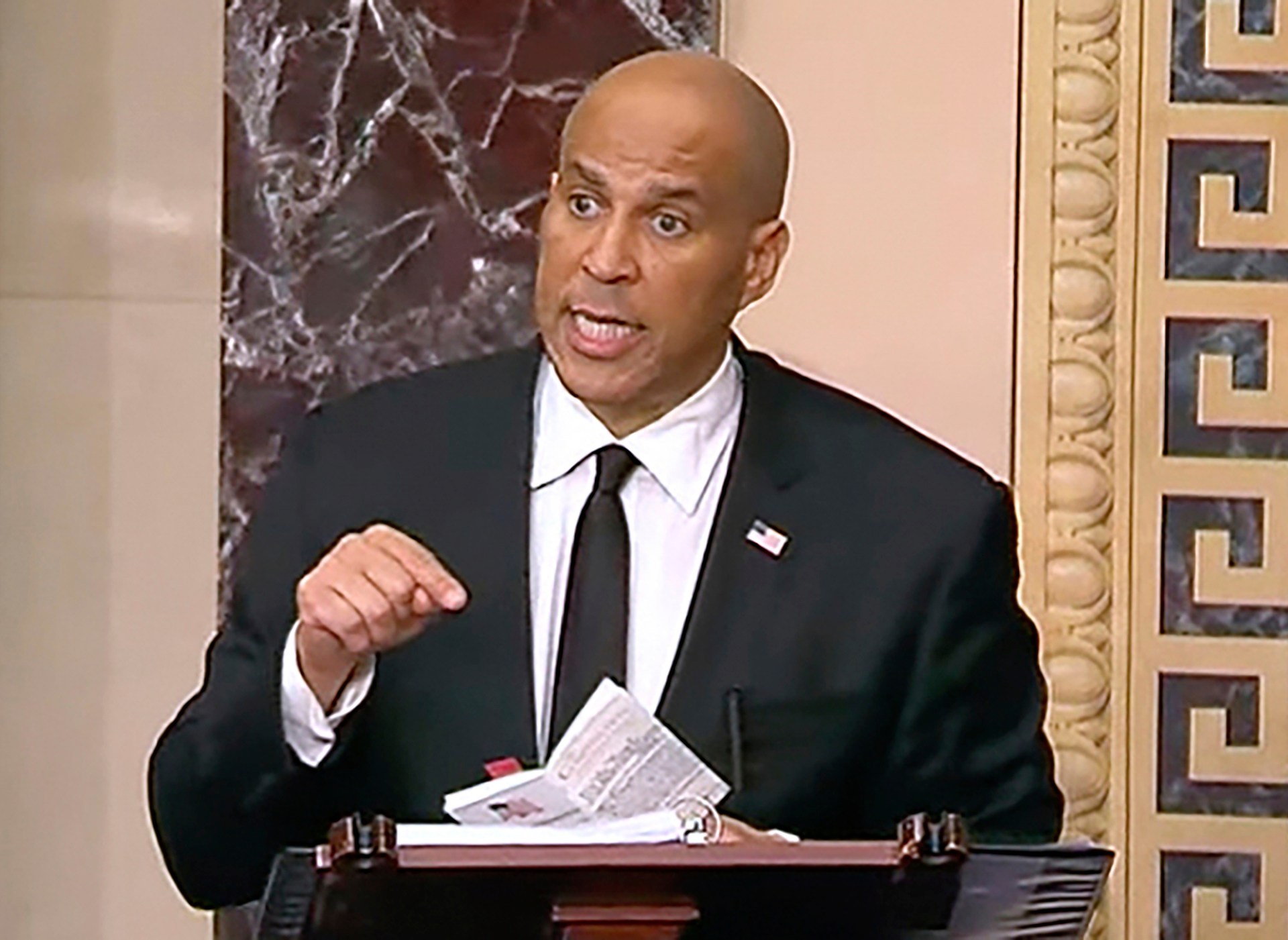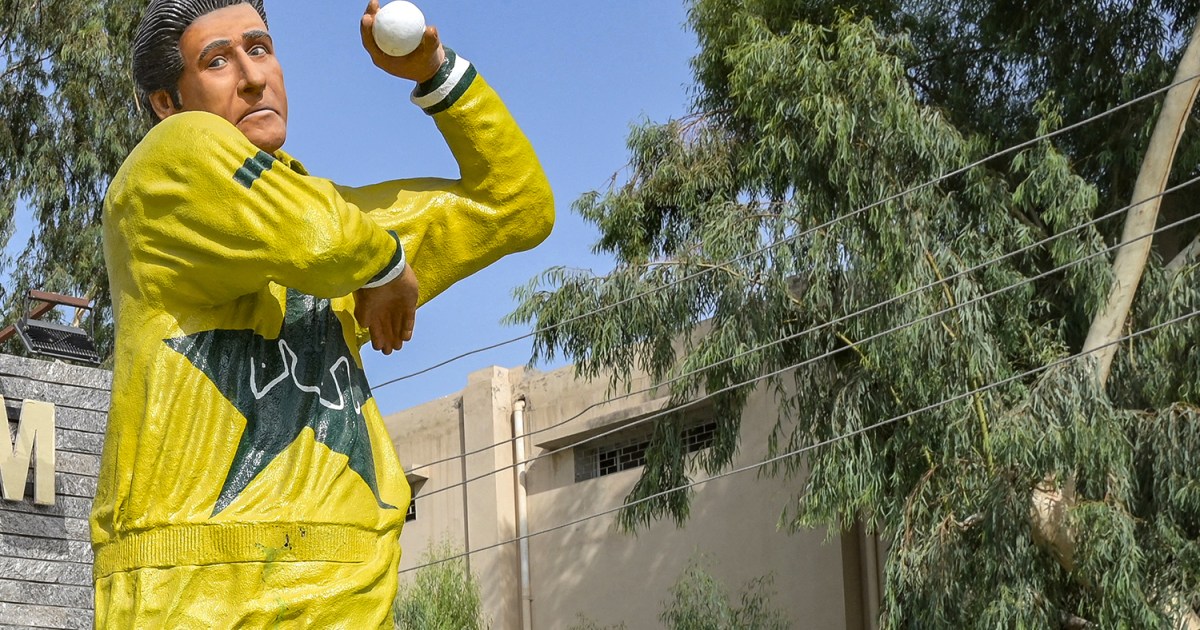From March 31 to April 1, New Jersey Senator Cory Booker delivered a record-breaking 25-hour filibuster on the Senate floor of the United States Capitol. In his marathon speech, Booker repeatedly chastised President Donald Trump for his discriminatory politics and policies and for his attempts to circumvent the US Constitution.
Booker also criticised both the Democratic and Republican parties for failing to do more to oppose Trump. “Do better than me. Do better than we in this body. We are flawed and failed people,” he said unironically, adding, “My voice is inadequate. My efforts today are inadequate to stop what they’re trying to do.” Two days later, he proved himself right. Booker voted against two resolutions that would have limited US arms sales to Israel – just as Israeli forces once again intensified their genocidal campaign in Gaza. In doing so, he aligned himself with one of Trump’s most extreme and violent foreign policy positions – and exposed the hollowness of the Democratic resistance. After all, you cannot claim to be fighting Trumpism at home while helping it advance abroad.
That contradiction sits at the heart of the Democrats’ paralysis. In the five months since Trump began his second term as president, meaningful opposition from the party has been almost nonexistent. The so-called resistance to his authoritarianism has been weaker than the sun over the Arctic in the dead of winter.
The reason is simple: On many of the most consequential issues – Israel, immigration, policing – the Democrats are not resisting Trumpism. They are participating in it. A centre-right party that shares core positions with its far-right opponent cannot mount real opposition. It can only pretend to.
It doesn’t help that the Democratic Party is, in many respects, as beholden to wealthy, right-wing donors as the Republicans. What the party lacks in vision, it also lacks in leadership. As the old saying goes: If you want to understand a politician’s priorities, follow the money. Or, in the words of Upton Sinclair in his 1941 novel Between Two Worlds: “Find out who’s putting up the money for a political party, and then you know what it will do.”
Take Booker’s votes against restricting arms to Israel. Since his first Senate run in 2013, he has received nearly $1m from pro-Israel political action committees (PACs) and individual donors. A 2019 report from The Intercept described how Booker regularly communicated with the leaders of the American Israel Public Affairs Committee (AIPAC) “like teenagers”. With such a cosy relationship, his votes for genocide may be immoral, but they are not surprising.
Then there is Hakeem Jeffries, the most powerful Democrat in the House of Representatives. In April, he and Booker held a two-person, all-day sit-in on the Capitol steps to protest proposed deep cuts to Medicaid, Medicare, and food and jobs assistance programmes. “As Democrats, we’re going to continue to stand on the side of the American people, and we will not rest until we bury this reckless Republican budget in the ground,” Jeffries declared.
Three weeks later, Trump’s “Big Beautiful Bill” passed the House 215–214. Although the Senate may revise it, Jeffries’s grandstanding had already proven hollow.
Jeffries has shown far more resolve against antigenocide protesters. In April 2024 when pro-Palestinian student protests intensified and police raided encampments at Columbia University, he defended the use of New York police to arrest protesters and dismantle the camps. “The antisemitic rhetoric and intimidation deployed by some students and outside protestors on college campuses in New York City and beyond is completely unacceptable and deeply disturbing,” Jeffries said in a news statement.
There was no credible evidence to support his claim. He issued no similar statement in defence of Palestinians nor did he condemn Islamophobia or Zionist attacks on protesters. But he did raise more than $1.15m from AIPAC and other pro-Israel donors during his 2024 re-election campaign.
Like Booker and Jeffries, other leading Democrats have chosen to posture against the marginalised rather than confront unjust policies. On January 30, Senator Chris Murphy of Connecticut posted on X: “In the first week, Trump removed 7,300 people. On average, Biden was removing 15,000 a week. Under Biden 72 percent of ICE [Immigration and Customs Enforcement] arrests were criminals. Under Trump it’s dropped to around 50 percent. Trump is removing less people and less criminals.” Whether he intended it or not, Murphy in effect endorsed a mass deportation regime that disproportionately targets migrants from Latin America and the Caribbean.
Murphy is a leader who equivocates. Just two months earlier, he had written that “mass deportation is a (terrible) response to Americans’ real sense they are helpless in the face of global forces.” Yet by May, he was boasting about supporting the “toughest bipartisan border security bill in a generation” as part of “choosing this country over Donald Trump’s campaign”. Murphy may be less beholden to corporate donors than others, but his role in leading the opposition is no less compromised. Even on issues on which Democrats have expressed rhetorical opposition – such as cuts to welfare and education – grandstanding has taken the place of real action.
Despite Jeffries’s occasional calls for a Democratic strategy to organise resistance, many in the party have chosen instead to cooperate with the administration. That explains how the Senate unanimously confirmed Marco Rubio – long an advocate of xenophobic and Islamophobic policies – as secretary of state by a vote of 99–0, including all 45 Democratic senators.
It also explains why 10 Democrats (nine senators, one House member), including Senate Minority Leader Chuck Schumer, supported a continuing resolution in March that many agreed would hurt ordinary Americans. “As bad as the CR is, I believe allowing Donald Trump to take even much more power via a government shutdown is a far worse option,” Schumer said.
With the Democratic Party applying the pressure of an ant on a mountain, the so-called resistance it claims to lead against Trump has been more than futile – it has become a grim parody.
Nothing illustrates the party’s rightward drift more clearly than its recent push to court billionaire and former Department of Government Efficiency chief Elon Musk. On June 5 after Musk’s public falling-out with Trump over the “Big Beautiful Bill”, Representative Ro Khanna said, “We should ultimately be trying to convince him that the Democratic Party has more of the values that he agrees with,” including “a commitment to science funding, a commitment to clean technology, a commitment to seeing international students like him”.
By “him”, Khanna seemed to mean rich, white, highly skilled migrants – just as Trump’s immigration plans have prioritised white South African farmers as “refugees” and just as Musk has argued that the US should accept only highly skilled immigrants. Khanna’s comments – and his campaign donations from individuals affiliated with Apple, Google, PayPal and Stanford University – place him squarely within the bipartisan elite consensus that dominates immigration and economic policymaking in the US.
To mount real opposition, a party must have a clear, unified idea of what it would do differently. The Democratic Party has failed to offer such a vision. It continues to stand with Republicans on issue after issue – and when it claims to stand against them, it rarely follows through.
It is long past time to stop hoping the Democratic Party will rescue the US from Trumpism. It won’t. It can’t. The party has become an unreliable and ideologically compromised actor in the struggle for democracy and justice. What is needed now is a mass movement to build a viable, independent, left-of-centre alternative. Because the Democrats have shown, again and again, that they are not it.



